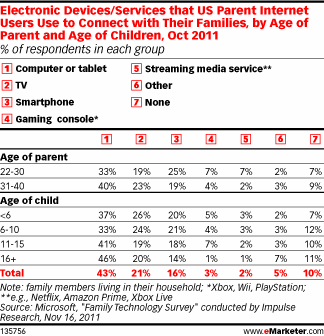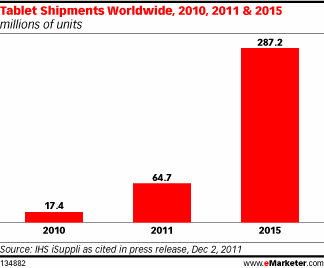Is The Next Frontier In Social Media Your TV?
Where are you watching the Big Game this year? Last year, that question was a locational where: a Super Bowl party, at home on the sofa or a local watering hole being the expected answer. This year, the “where” is just as likely to be device specific. On a PC? A tablet? Or a Verizon […]
 Where are you watching the Big Game this year?
Where are you watching the Big Game this year?
Last year, that question was a locational where: a Super Bowl party, at home on the sofa or a local watering hole being the expected answer. This year, the “where” is just as likely to be device specific. On a PC? A tablet? Or a Verizon mobile device? All are possibilities. For the first time, this year’s Super Bowl won’t just be broadcast, it will be streamed with a host of digital extras — such as real-time stats and multiple camera angle options — as part of the deal.
NBC hasn’t announced it yet, but I’m betting there will be a social component to the stream, too. If the network doesn’t offer it, there are plenty of other ways to socialize TV viewing, Television + digital is one of the fastest-growing trends in social media.
The Death Of “Appointment” Television?
Television has always been an inherently social activity, from sitting around the tube with friends and family to post-mortem water cooler discussions the morning after a broadcast. But that’s been waning of late. These days, families are more likely to gather around a computer for a bonding media experience. DVRs mean programming is often time-shifted. There’s less and less “event” viewing — shows like sporting events or the Academy Awards that are timely or time-sensitive enough to warrant watching live.
All the above is to say nothing of cord-cutters, people who have kissed their cable boxes and satellite dishes goodbye. A recent Deloitte survey puts these at nine percent of the population, with another 11 percent giving the matter serious consideration. Yet cord-cutting doesn’t scare the industry as much as people who will never even have cords to cut: younger people starting out who are accustomed to consuming content in digital channels. Why bother with a cable subscription, particularly in this economy?
Putting Social Back Into The TV Experience
What can save television? Following its audience online, and re-socializing television digitally by integrating it with social media.
This is something NBC recognizes in its decision to stream the Super Bowl. They’ve been streaming Sunday Night Football for four seasons now and learned the streams are not just being used by fans who aren’t watching on TV. “Many of the page views come from people using the service as a complement to the traditional broadcast,” said the network in a statement.
 That number will only increase as more Americans curl up in front of their sets with tablets (not to mention web-connected TV sets). Four seasons ago, tablet viewing wasn’t even an option. By the end of 2011, close to 65 million tablets had been shipped worldwide, a number expected to soar to 287 million by 2015 as device prices plummet. Tablet viewing will make TV viewing all the more connected to social networks, and not just via Facebook and Twitter. A host of new services and apps are being developed, both to make viewing more social and to measure social television viewing. They go way beyond tweeting or posting to Facebook while watching the game (or the sitcom).
That number will only increase as more Americans curl up in front of their sets with tablets (not to mention web-connected TV sets). Four seasons ago, tablet viewing wasn’t even an option. By the end of 2011, close to 65 million tablets had been shipped worldwide, a number expected to soar to 287 million by 2015 as device prices plummet. Tablet viewing will make TV viewing all the more connected to social networks, and not just via Facebook and Twitter. A host of new services and apps are being developed, both to make viewing more social and to measure social television viewing. They go way beyond tweeting or posting to Facebook while watching the game (or the sitcom).
Social TV Beyond Facebook And Twitter
GetGlue is currently the top social entertainment network for TV viewing (it has movie and music components, too). Users can check-in to shows, get recommendations and earn rewards and badges. The whole shebang integrates with Facebook, and apps are available for numerous wireless platforms. Miso is another player in this category. In addition to the social dimension, it offers quotes, information and trivia synched to the programming.
SocialGuide matches, in real time, TV viewing with online social media related to the show (currently limited to Twitter and Facebook). Star and show accounts, hashtags, and audience comments are found and displayed by a combination of algorithms and editorial input. The newly-launched company intends to branch into social TV guides, ratings and analytics. Other players in this space include Bluefin Labs, Networked Insights and TrendrrTV. In the UK, TankTop TV delivers personalized listings for online programming based on collaborative filtering.
YouToo combines social with the programming itself. The 15 million subscriber cable network is also available on digital broadband. It encourages its viewers to download mobile apps and upload 15-second “Fame Spot” videos of themselves. They can comment on a variety of topics, create “Peoplemercials,” and even propose marriage on the air.
PlayAlong is described as “a massively multiplayers dual screen interactive experience, synchronized with TV shows.” It allows, for example, viewers to play alongside TV game show contestants.
Most (but not all) of the above social television services assume you’re watching TV on a TV. You don’t have to, of course, and alternative services including Boxee, Xbox Live, Roku and Apple and Google TV all link to friends as well as to social services such as YouTube.
Social TV is one of the major trends to watch this year, and for the foreseeable future. Expect television to be increasingly decoupled from the set and watch for the epitome of “lean-back” media to tilt quite precariously in the opposite direction.
Contributing authors are invited to create content for MarTech and are chosen for their expertise and contribution to the martech community. Our contributors work under the oversight of the editorial staff and contributions are checked for quality and relevance to our readers. MarTech is owned by Semrush. Contributor was not asked to make any direct or indirect mentions of Semrush. The opinions they express are their own.
Related stories
New on MarTech